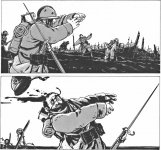jazzeum
Four Star General
- Joined
- Apr 23, 2005
- Messages
- 38,439
A French cartoonist has written two books about WW I, It Was the War of the Trenches and God-d@mn this War. http://www.nybooks.com/blogs/nyrblo...ware&utm_term=Grim Fragments of the Great War
The following is an excerpt from an article in the New York Review of Books.
*******
“The only thing that interests me is man and his suffering,” declares French cartoonist Jacques Tardi in the foreword to his It Was the War of the Trenches, “and it fills me with rage.” The book that follows—a series of delicately drawn, thoroughly researched, thoroughly grim vignettes of life in the trenches during World War I—bears him out. Tardi’s war does not unfold linearly, nor, although it sticks to the French troops, does it give us a distinct set of characters to follow. Instead, it skips from soldier to soldier and year to year, starting with a series of artillery barrages (“The muzzles of the cannons turn red hot and their servants go deaf”) in late 1917, then turning back to the outbreak of war in 1914 (an old man is beaten to death in a cafe for refusing to sing La Marseillaise, “one of the first victims of the war”), then ahead again to a French infantry charge at an unspecified battle in 1916, and on, crabwise, from there.
****
The following is an excerpt from an article in the New York Review of Books.
*******
“The only thing that interests me is man and his suffering,” declares French cartoonist Jacques Tardi in the foreword to his It Was the War of the Trenches, “and it fills me with rage.” The book that follows—a series of delicately drawn, thoroughly researched, thoroughly grim vignettes of life in the trenches during World War I—bears him out. Tardi’s war does not unfold linearly, nor, although it sticks to the French troops, does it give us a distinct set of characters to follow. Instead, it skips from soldier to soldier and year to year, starting with a series of artillery barrages (“The muzzles of the cannons turn red hot and their servants go deaf”) in late 1917, then turning back to the outbreak of war in 1914 (an old man is beaten to death in a cafe for refusing to sing La Marseillaise, “one of the first victims of the war”), then ahead again to a French infantry charge at an unspecified battle in 1916, and on, crabwise, from there.
****


